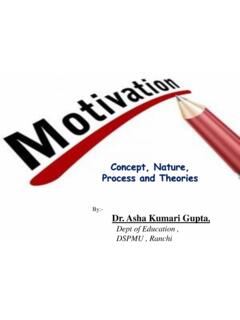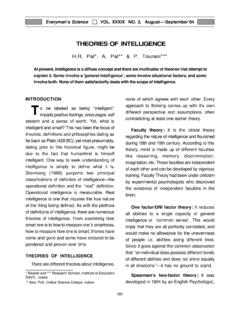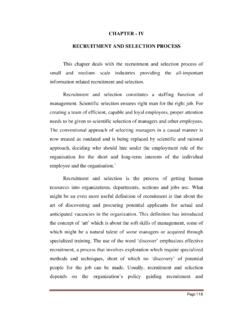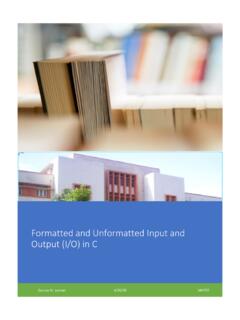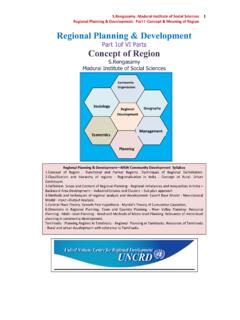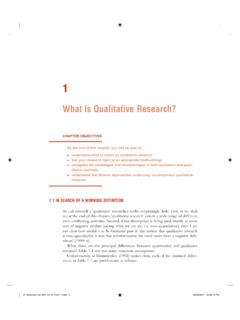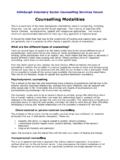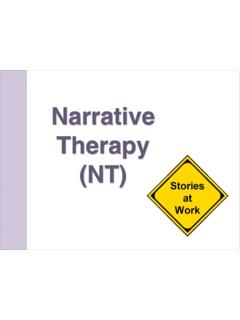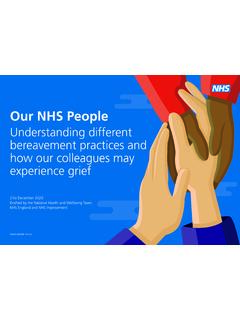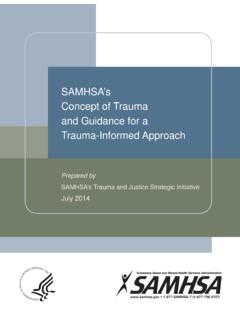Transcription of The counselling process
1 The counselling ProcessPage1 counselling AND CONSULTANCY PSYCHOLOGYThe counselling process :Stages of the counselling processStage1:InitialDisclosureStage 2: In-depth ExplorationStage 3: Commitment to actionThree stages ofCounsellingin PerspectiveSunilKrishnan,Departmentof Psychology, University CollegeKeralaUniversity, Trivandrum, counselling ProcessPage2 IndexIntroduction .. and 5 The Role of the 5 counselling Skills ..5 Stages of the counselling process :..7 Some Misconceptions About counselling .. 8 The counselling process ..10 Stage 1: Relationship Building-Initial 2: In-DepthExploration-Problem 3: Goal Setting-Commitmentto Selectingand Defining Goals .. 20 Summary ..21 Three stages of counselling and limitations of Psychoanalytic Approach to , Ego and 26 Client Centred/Non Directive 26 Benefits and limitations in Approach to Approach to counselling ProcessPage3 IntroductionCounselling is a concept that has existed for a long time.
2 We have sought through the ages tounderstand ourselves, offer counsel and develop our potential, become aware of opportunitiesand, in general, help ourselves in ways associated with formal guidance most communities, there has been, andthere still is, a deeply embedded conviction that,under proper conditions, people can help others with their problems. Some people help othersfind ways of dealing with, solving, or transcending schools, if the collaboration between teachers and students is good, students learn in apractical way. Young people develop degrees of freedom in their lives as they become awareof options and take advantage of them. At its best, helping should enable people to throw offchains and manage life situations economic and social changes have, over the years, changed the ways in whichwe manage our lives. Consequently, not all the lessons of the past can effectively deal withthe challenges of modern times.
3 Effective counselling , especially in institutions of learninghas now become important. Boys and girls, and young men and women, need to be guided inthe relationships between health and the environment, earning skills, knowledge, andattitudes that lead to success and failure in need for counselling has become paramount in order to promote the well-being of thechild. Effective counselling should help to improve the self-image of young people andfacilitate achievement in life tasks. counselling should empower girls and boys to participatefully in, and benefit from, the economic and social development of the counselling ProcessPage4 The counselling ProcessPage5 CounsellingMany people will, at some point in their lives, find themselves in the role of a counsellorwithout having a true understanding ofthe concept of counselling or what the role of theprofessional counsellor is a big difference between a professional counsellor and a person who uses somecounselling skills as part of their role.
4 For example their role as a friend or counsellor is a highly trained individual who is able to use a different range ofcounselling approaches with their this assignment I am trying tointroducetheprocessesof counsellingand threestagesof thecounselling processandthreestages ofCounselling in Perspectivewith counselling theories.' counselling ' can be a confusing term-it often has different meanings for Concise Oxford Dictionary (9th Edition) gives at least two definitions ofcounselling, which appear to be conflicting, adding to potential confusion: give advice to (a person) on social or personal problems, especially professionally. and theprocess of assisting and guiding clients, especially by a trained person on aprofessional basis, to resolve especially personal, social, or psychological problemsand difficulties.
5 counselling is: The process that occurs when a client and counsellorset aside time in order to exploredifficulties which may include the stressful or emotional feelings of the client. The act of helping the client to see things more clearly, possibly from a different can enable the client to focus on feelings, experiences or behaviour, with a goal tofacilitating positive change. A relationship of is paramount to successful will usually explain their policy on confidentiality, they may, however, berequired by law to disclose information if they believe that there is a risk to isnot: Giving advice. Judgemental. Attempting to sort out the problems of the client. Expecting or encouraging a client to behave in a way in which thecounsellor may havebehaved when confronted with a similar problem in their own life. Getting emotionally involved with the client.
6 Looking at a client's problems from your own perspective, based on your own value counselling ProcessPage6 counselling and PsychotherapyBoth psychotherapy and counselling are terms that are used to describe the terms relate to overcoming personal difficulties and working towards is ahelping approachthat highlights the emotional and intellectualexperience of a client, how a client is feeling and what they think about the problem theyhave sought help , however, is based in thepsychodynamic approachtocounselling-it encourages the client to go back to their earlierexperiences and explore howthese experiences effect their current problem .A psychotherapist, therefore, helps the client to become conscious of experiences which theywere previously unaware , however, are less likely to be concernedwith thepast experiences of the client and are generally trained in ahumanistic approach, usingtechniques from client-centred Role of the CounsellorFirst and foremost the counsellor is aware that no two people are two peopleunderstand the same language in the same way.
7 Their understanding will always be linked totheir personal experience of the , during the counselling process , it isimportant that the counsellor does not try to fit clients into his/her idea ofwhat they should beand how they should role of the counsellor is to enable the client to explore many aspects of their life andfeelings, by talking openly and in such a way it is rarely possible with familyor friends, who are likely to be emotionally involved and have opinions and biases that maybe detrimental to the success of the is important that the counsellorisnotemotionally involved with the client and does not become so during counsellor neither judges, nor offers counsellor gives the client anopportunity to express difficult feelings such as anger, resentment, guilt and fear in aconfidential counsellor may encourage the client to examine partsof their lives that they may havefound difficult or impossible to face may be some exploration of earlychildhood experiences in order to throw some light on why an individual reacts or respondsin certain ways in given isoften followed by considering ways in which theclient may change such counselling reduces confusion, allowing the client to make effective decisionsleading to positive changes in their attitude and/or counselling is notadvice-giving and is not acting on someone else's behalf (these are more the roles of a lifecoach).
8 The ultimate aim of counselling is to enable the client to make their own choices,reach their own decisions and to act upon them SkillsCommunication skillsare obviously of utmost importance to counsellors, these skillsincluding:active listening,clarification,reflectionandeff ective questioning counsellor will attempt to build a certain amount ofrapportwith their client, but not to anextent that would allow them to become emotionally need to be empathetic, seeing things from the client s point of view, rather thansympathetic (feeling sorry for their clients).Empathy can help the counsellor to askappropriate questions and lead the client to positive counselling ProcessPage7 Objectivesof this section: List some misconceptions about counselling Define the counselling process Identify the steps in thecounselling process Explain how the counsellor createsempathy Elaborate on the role of genuineness inbuilding counsellor-client relationship Discuss the role of problem assessment in counselling Describe goal setting in counsellingStages ofthe counselling Disclosure-Relationship Building, Exploration-Problem to action-Goal SettingOVERVIEWM isconceptions about CounsellingThe counselling ProcessStep 1: Relationship Building Empathy GenuinessStep 2: Problem Assessment Why assess?
9 What to assess? How to use assessment?Step 3: Goal SettingSummary What actually happens in counsellingmay depend less on the theoreticalorientation of the specific counsellor thanon a set of more general features of thecounselling situation as a particular type ofhelping relationship .A common set of principles that cuts acrossmost forms of counselling theories isdescribed as thecounselling process , whichwill beexamined below. Focus will be onhow two strangers meet and begin toestablish understandings that graduallyevolve into a meaningful and counselling ProcessPage8 For some people, seeking professional help is out of the question. counselling is thought tobe for losers, not people who are strong and capable. However, the vast majority of peoplewho seek counselling do so because it takes great courage and strength to work on their ownissues and become proactive in improving their do you view counselling ?
10 Thefollowing are some misconceptions about what counselling is and how it works: counselling is only for people who have serious emotional or don t have to be in a crisis to go for counselling . When your vehicle isn't runningproperly or as well as it should, it doesn't necessarily mean it needs a major overallbut rather a same could apply to you; counselling couldbe used only asa tune-up for problems you may be facing. Why wait until you can no long function athome, school, work before seeking you arenot feeling well physically,you seek the help of a same principle applies to if youarenot feelinggood about your life or some aspect of it. counselling is for people who are too weak to overcome an addiction or has someothertype of inadequacy in dealing with problems on their individual is not psychologically impaired or weak if they are going forcounselling.
